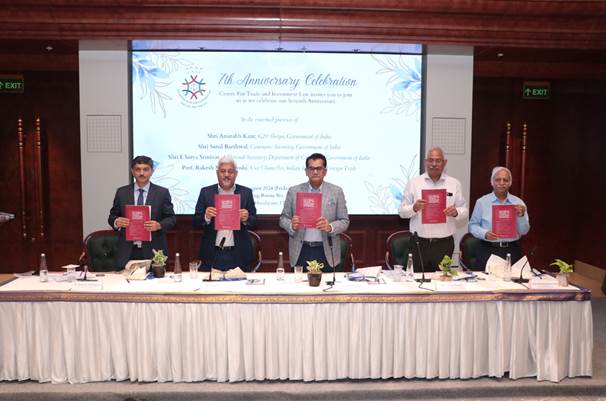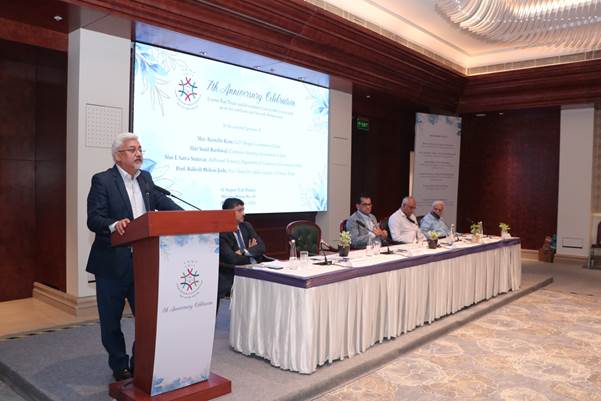The Centre for Trade and Investment Law (CTIL) at the Indian Institute of Foreign Trade, New Delhi celebrated its seventh anniversary event at Bharat Mandapam, New Delhi. At the anniversary event, the trade policy think tank of the Government released the Special Issue of the Global Trade and Customs Journal (GTCJ) and its Seventh Anniversary Magazine on “India’s G20 Presidency”.


The event was graced byG20 Sherpa, Government of India, Shri Amitabh Kant; Commerce Secretary, Shri Sunil Barthwal; Additional Secretary, Department of Commerce, Shri L. Satya Srinivas; andVice Chancellor, Indian Institute of Foreign Trade (IIFT), Shri Rakesh Mohan Joshi.
The event marked the seventh foundation day of CTIL asa government think tank and advisory body. CTIL was established in the year 2016, by the Ministry of Commerce and Industry, Government of India, to develop international trade and investment law capacity in the country,and provide the government with sound and rigorous legal analysis of international trade and investment law issues. Since its inception, CTIL has been regularly advising the Department of Commerce and other governmental departments and agencies on emerging issues in international economic law, with a focus on WTO law and bilateral trade agreements. In its time, the Centre has provided over 2,500 advisory opinions to the Government of India on various international trade issues, including inputs on bilateral engagements.
In his keynote address, India’s G20 Sherpa Shri Amitabh Kant highlighted the importance of the G20 as a premier forum for major economies to address major issues, such as international financial stability, climate change mitigation and sustainable development.He pointed out that despite the critical role of the Global South and emerging markets, various global economic forums and institutional banks failed to address the concerns of these nations and their views on climate change and sustainability. As India’s G20 Sherpa, he provided his insights on how the Indian G20 Presidency with its inclusion of the African Union will shape the direction of international economics, sustainable development, and financial growth in an inclusive manner.
Shri Kant noted that the G20 operates without a permanent secretariat, and the presidency provides functional support and operates on a consensus-based system. This is crucial as there was 100% consensus on all the 83 paragraphs in the New Delhi Leaders’ Declaration, he added.

The Sherpa also applauded CTIL and its young and multidisciplinary lawyers on the work they have been doing for the Department of Commerce, in the fields of international trade and investment law.
Addressing the trade and investment law community and policymakers, Union Commerce SecretaryShri Sunil Barthwal pointed out the relevance of the Global South and the need to integrate the needs of developing and Least Developed Countries into the global trade system. In particular, he mentioned the upcoming Global South Summit and African Summit as forums that can find ways to bring the concerns of these countries to a global level.
The Secretary observed that non-trade issues have increasingly been emerging in trade negotiations, raising the need for cross-disciplinary capacity building in FTA negotiations for India and other developing countries.

The Centre for Trade and Investment Law (CTIL) was established in the year 2016 by the Ministry of Commerce and Industry, Government of India, at the Indian Institute of Foreign Trade (IIFT). The Centre’s primary objective is to provide sound and rigorous analysis of legal issues pertaining to international trade and investment law to the Government of India and other governmental agencies.
The Centre is aiming to create a dedicated pool of legal experts who could provide technical inputs for enhancing India’s participation in international trade and investment negotiations and dispute settlement. The Centre also aims to be a thought leader in the various domains of international economic law such as WTO law, international investment law and legal issues relating to economic integration.

Comments are closed.